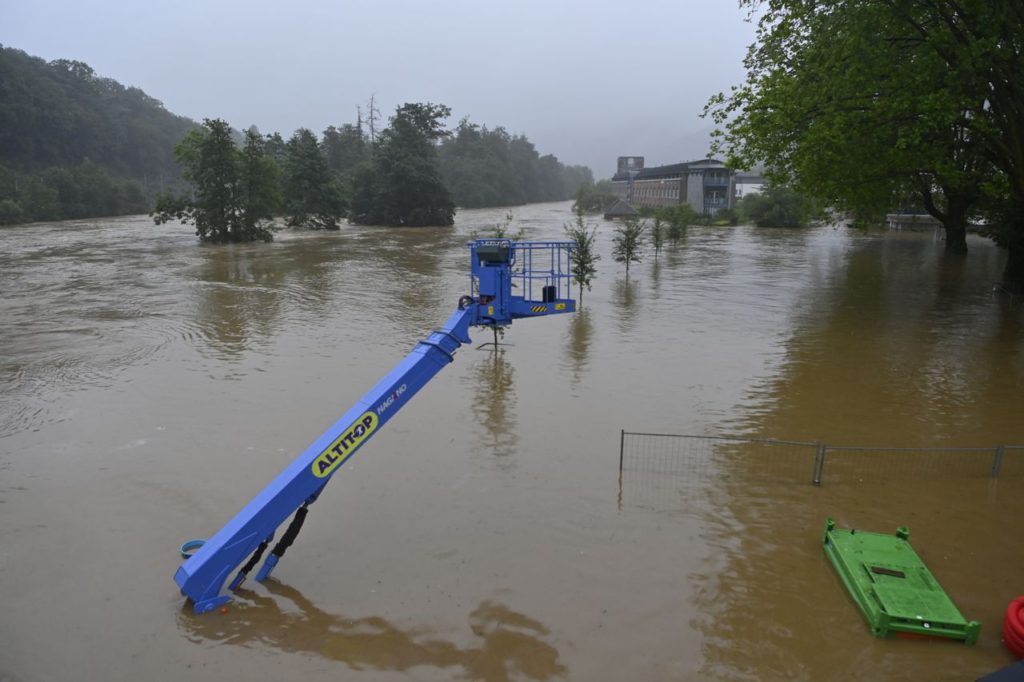As experts are expecting that the water level of the Meuse river will continue to rise until noon and the water has starting flowing over the dyke, the mayor of Maaseik in the Limburg province urged people to stay away.
Six Limburg municipalities along the Meuse river were evacuated on Thursday evening, but the peak is not expected until after noon in Maaseik.
"Experts expect the water to keep rising until noon. We therefore ask you to stay away from Maaseik," mayor Johan Tollenaere said in a Facebook post. "Do not come shopping, do not come to work (telework if possible), do not visit."
"It is going to be a few scary hours," he said, adding that there is "a real risk" that the dyke will break.
"The situation in Maaseik is still critical. In Heppeneert, the water is seriously coming over the dyke. We are placing sandbags, the army and the Civil Protection are helping out," Tollenaere added.
Whether or not the current situation will also turn into a "disaster" for Maaseik and other municipalities depends on the Monsin dam, just above Liège, according to Limburg governor Jos Lantmeeters.
If this dam fails, a mass of extra water will come from Liège into Limburg - a risk that is not inconceivable, as only two of the six sluice gates are working.
"As long as all the problems in Liège are not resolved, we do not know whether that lock will hold," he said on local radio. "We probably will not know until tomorrow morning whether we have made it."
Additionally, local residents are asked to not go looking at the Meuse anymore, as disaster tourists are in danger of obstructing the emergency and security services on their way to Maaseik.
Related News
- 'Leave if you can': Mayor of Liège seeks to evacuate city
- Heavy rainfall and flash floods: another catastrophe for farmers?
- Damage severe weather: At least 14 dead, four missing and thousands without electricity
"It is still wise to leave the city until the situation clears up," said Tollenaere, adding that people living in the parts that had already been evacuated are not yet allowed to go back to their homes.
"The police will also take action against people who come to the Meuse without a reason, and we may soon close off part of the Maaseik ring road," he said.
Additionally, although no precipitation is expected in the coming hours, critical flooding is still possible in various places in Limburg and Flemish Brabant, according to Katrien Smet of the Flemish Environment Agency.
Many waiting basins are full, which means that the water will still rise in those locations, and a lot of water is still coming from Wallonia towards Flanders, she told De Morgen.
Rescue helicopter deployed
In the meantime, the first NH90 helicopter of Belgium's Defence Ministry took off from Bierset airport in the Liège province on Friday morning.
It will be used for rescue and evacuation missions in the disaster area hit by the storm, said Kurt Verwilligen, spokesperson for the army's air component on Flemish radio.
Several Defence helicopters had been on stand-by for some time, but could not yet be deployed due to the weather conditions and poor visibility.
"High-voltage power lines may be on a staff map, but construction cranes, for example, are not," he said. "If you fly over the sea, the worst that can happen is that a helicopter ends up in the water, but in built-up areas, that is on top of houses."
"The last thing we need now is a flight disaster on top of the flooding," Verwilligen added.
More helicopters could be deployed in the coming hours, as one is ready to take off in Koksijde, the federal police have some, and a French helicopter is at Bierset, according to him.
Walloon Minister-President Elio Di Rupo pointed out that hundreds of people were still trapped in Liège and other areas in Wallonia, and that the emergency workers on the ground could not reach them on Thursday evening.
Helicopters could not fly due to poor visibility, while the boats deployed were sometimes unable to cope with the force of the water, he said on Walloon radio on Friday morning.
In the municipality of Pepinster in the Liège province, three people who had just been taken off their rooftops went missing on Thursday after a rescue boat belonging to the fire brigade overturned.
"Even at the level of the army, boats are needed with engines that are two to three times more powerful," Di Rupo said. "Neither the army nor the Civil Protection had the right equipment."
"When houses collapse, it is due to the force of the water. But when we are unable to reach the victims of disasters, then we must learn lessons from that," he added.
In total, the death toll as a result of the severe weather has risen to 14 in Belgium, and at least four people are still missing, including a 15-year-old girl who was swept away by the river Ourthe on Thursday morning and has still not been found.

